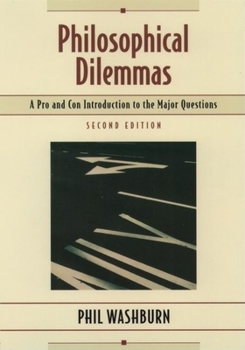Philosophical Dilemmas: A Pro and Con Introduction to the Major Questions
Philosophical Dilemmas: A Pro and Con Introduction to the Major Questions, 2/e, is a lucidly written and comprehensive introduction to philosophy featuring sixty brief essays arranged in pairs. Each pair answers one of the standard philosophical questions, such as "Does God exist?" or "Is morality relative?," with affirmative and negative responses. Each essay takes a definite stand and promotes it vigorously, creating a sharp contrast between the two positions and giving each abstract theory a more personal and believable "voice." While the essays often employ traditional arguments of great philosophers, they present the ideas in contemporary language with vivid examples. The accessible style and conflicting answers encourage students to examine the different positions and to think carefully about which essay makes the stronger case. While other textbooks present a series of excerpts and theories without attempting to coordinate them into a larger picture, Philosophical Dilemmas teaches students about the process of thinking philosophically and encourages them to construct their own coherent worldviews. This second edition features new sections on race, gender, euthanasia, and Buddhist philosophy, showing students how philosophy applies to issues that they may encounter in their own lives.
The text incorporates numerous pedagogical features including a list of historical parallels, key terms, chapter summaries, a glossary, an introduction to each issue, and critical questions following each essay. Brief sections throughout the book describe numerous critical thinking techniques demonstrated by the essays. An annotated bibliography of historical examples for each issue and useful lists of contemporary sources further enhance the text's utility. An Instructor's Manual, including chapter summaries, writing assignments, and test questions, is available.
The text incorporates numerous pedagogical features including a list of historical parallels, key terms, chapter summaries, a glossary, an introduction to each issue, and critical questions following each essay. Brief sections throughout the book describe numerous critical thinking techniques demonstrated by the essays. An annotated bibliography of historical examples for each issue and useful lists of contemporary sources further enhance the text's utility. An Instructor's Manual, including chapter summaries, writing assignments, and test questions, is available.
Format:Paperback
Language:English
ISBN:0195134966
ISBN13:9780195134964
Release Date:December 2000
Publisher:Oxford University Press
Length:464 Pages
Weight:1.54 lbs.
Dimensions:6.1" x 1.0" x 9.1"
Customer Reviews
3 ratings
Good Logical Introduction
Published by Thriftbooks.com User , 16 years ago
Philosophical Dilemmas: A Pro and Con Introduction to the Major Questions The author has considered all views while discussing regarding something. As an example, the discussion of religions and philosophical views. The author has always tried to discuss logically. This is a good text book for a beginer trying to study of philosophy.
Good Survey of Philosophical Methodology.
Published by Thriftbooks.com User , 18 years ago
I agree with the prior review that this is a very accessible text covering a variety of philosophical issues, but I would add that I think it is primarily valuable as a tool for teaching philosphical methodology and general critical thinking skills, rather than serving as a good introduction to philosophy. It's divided into a number of pro and con articles written by the author that exemplify certain argumentative methods (such as thought experiments, ad hominem arguments, infintie regresses, etc.). The content of these pro/con essays is very cursory. They serve, at best, as introductions for further discussion, rather than as fully developed philosophical positions. I don't mean this as criticism, necessarily. As a survey of philosophical methodology, the book is excellent. But as an introduction to philosphy for a lay audience, there are much better (and cheaper) choices available.
An Excellent Introduction.
Published by Thriftbooks.com User , 24 years ago
Phil Washburn introduces us to the major problems of philosophy through a series of brief, clearly written, pro and con essays. Very few historical figures are discussed (although there is a section recommending further readings at the end of each chapter), so this book presupposes no prior knowledge of philosophy. Very engaging and easy to read. Highly recommended for the general reader and for topically-oriented introductory classes in philosophy.






